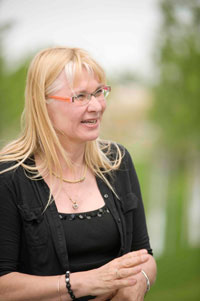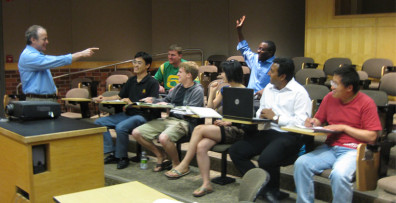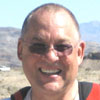Voiland Graduate Student Offered Distinguished Fellowship at PNNL
sue@susanweaver.net
PULLMAN, Wash. – Imagine microorganisms that have the ability to respire, or breathe, electrons onto solid materials to create energy. And they can communicate with each other over long distances.
How is this possible?
Ryan Renslow, a Washington State University engineering Ph.D. candidate, hopes to find out.
He recently received the Linus Pauling Distinguished Postdoctoral Fellowship at the Pacific Northwest National Laboratory (PNNL) in Richland, Wash. He is researching electrochemically active communities of microorganisms, called biofilms, to discover the mechanism behind extracellular electron transfer and how this allows cell-to-cell and cell-to-mineral interactions in subsurface sediments.
Renslow is a graduate student with Haluk Beyenal, associate professor in the Gene and Linda Voiland School of Chemical Engineering and Bioengineering. Renslow started doing research lab work at PNNL as a graduate student and completed a lab rotation there three years ago.
Research in this field has grown significantly in the last two decades, resulting in the identification of microorganisms that can create energy. Much of that research has turned to application of the energy output, but Renslow is interested in the fundamentals behind the process.
At PNNL, he will have access to research instruments and laboratories that use advanced technologies.
“I want to develop new scientific capabilities and integrate existing technologies and techniques already present at PNNL,” Renslow said. Current standard tools cannot provide the data needed to answer his research questions.
After completing work at PNNL, Renslow wants to become a professor or a research scientist, ultimately allowing him to stay in the field and continue conducting fundamental research.
According to the PNNL website, the Linus Pauling fellowship is aimed at “next generation scientists and engineers who will push the boundaries of science to world-recognized discoveries.”
The fellowship provides recipients full funding for their major research projects.
Renslow graduated from Central Valley High School in Spokane, Washington. Read this article at WSU News
Contacts:
Ryan Renslow, WSU College of Engineering and Architecture, 335-4332, rrenslow@wsu.edu
Tina Hilding, WSU College of Engineering and Architecture, 335-5593, thilding@wsu.edu








